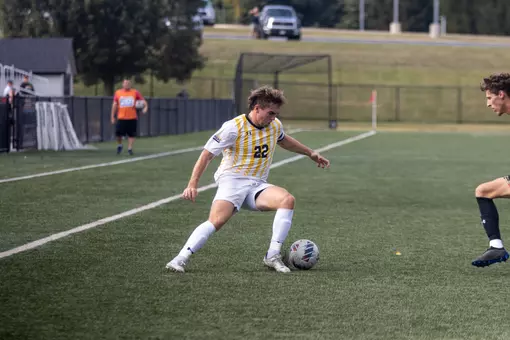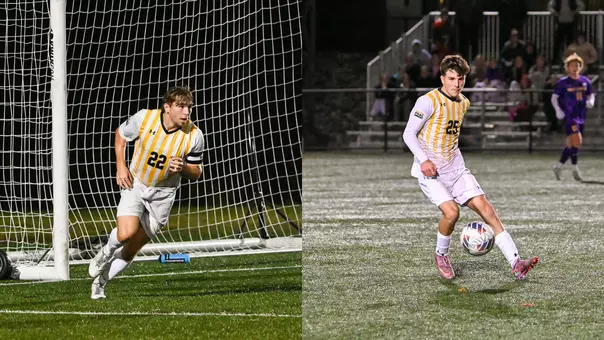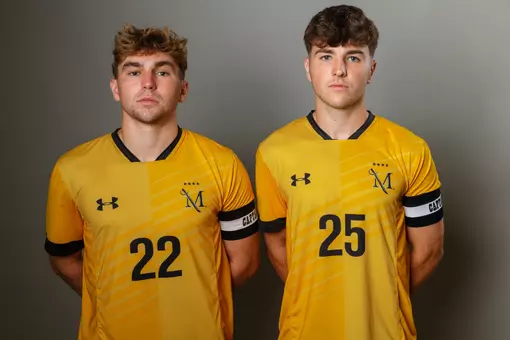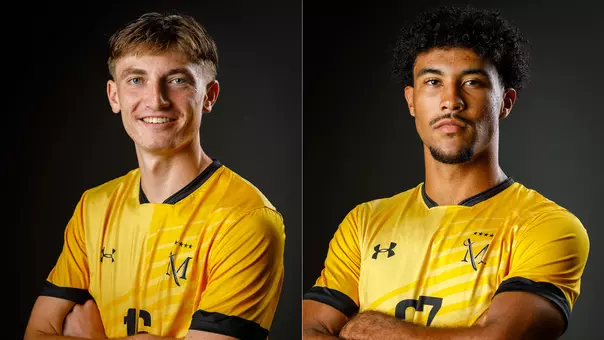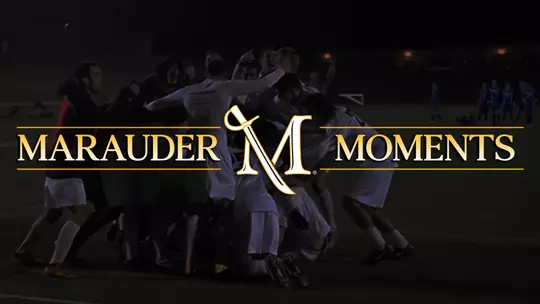
Marauder Moments: Spectacular soccer shootout blazes trail to final four
Bryan Kast, Athletic Communications Graduate Assistant
5/19/2020
Marauder Moments is a series that breakdowns memorable plays and events in the history of Millersville Athletics with the athletes and coaches who made those moments happen. Our second spotlight is on the men’s soccer penalty shootout between Millersville and Rockhurst in the 2011 NCAA Elite Eight which took place at Chryst Field. Contributing to the story with their surprisingly sharp memories were head coach Steve Widdowson, goalkeeper Brad Benzing, and 2011 seniors Pat Buffuto and John Claffey.
There is nothing quite like a penalty shootout in the sport of soccer. For one fraction of a second the hopes of teams, fans, players, and sometimes entire countries rests on the foot of a shooter and the reaction of a goalkeeper. A penalty make is celebrated exuberantly, with the shooter hailed as a hero. A penalty miss, however, can cause agony, despair, and linger in the memory of all those involved for years to come. Infamous penalty misses like the one by England’s Gareth Southgate in the Euro 96 semifinal against Germany still cause emotional reactions in supporters and the man himself nearly 25 years later.
It sounds simple enough: five shooters from each team take five shots and whichever team makes the most wins. Yet the amount of drama and emotional distress created by a shootout is unmatched in sport. A shootout can create legends, villains, and be talked about for a lifetime.
One such high-stakes shootout took place on November 11, 2011 between No. 6 Rockhurst and No. 21 Millersville in the quarterfinal round. The winner was moving on to the NCAA Division II Final Four, while the loser’s season was over.
Prior to all of the forthcoming dramatics the two teams had gutted out 110 minutes of scoreless soccer in front of almost 1,300 fans at Chryst Field in Millersville, Pa.
“We kind of anticipated that it would be a low-scoring game”, said Marauders head coach Steve Widdowson. “We knew they would be, man-to-man, a little bit better than us and a little more experienced. But we knew if we could defend well and everyone committed to that we had a chance. It had 1-0 or nil-nil written all over it. Even without a score it was still a very entertaining game.”
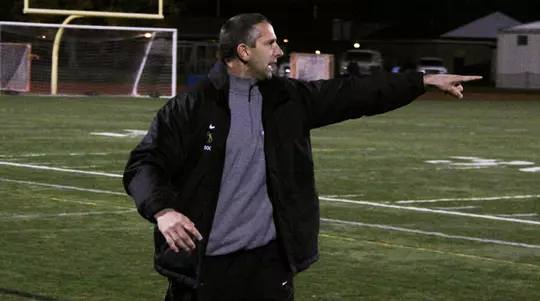
“They were definitely a great team; probably the best team we had played that year,” said Brad Benzing, the then-redshirt-freshman goalkeeper. “Defensively we were just outstanding. The defense answered the call time and time again, weathering so much that the ball rarely got to me. It was a complete team effort, but that was the longest game I’ve ever played in. It felt like four or five hours instead of two, especially when you get down to the last 10 minutes. Time just stops.”
"My mindset was, “If I can hold a team to zero, I’ve done my job, and we'll be able to win somehow,” said defender John Claffey, who was voted All-American in 2011. “It was 110 minutes of really trying hard to hold them to zero.”
“I’ll never forget that game,” said Pat Buffuto, one of the senior captains on the 2011 team. “Playing Rockhurst was exhausting. We tried to break them down early and went at them a bit, which was positive, but they came us at in the second half. It was almost a mental battle as much as it was a physical battle.”
Truth be told, not many opponents broke down the Marauder defense in 2011. The team entered the NCAA Elite Eight having shut out its last five opponents, including a 1-0 result over Bloomsburg in the PSAC Championship game to give the program its first-ever PSAC title. The blanking of Rockhurst made it six straight shutouts (five in the postseason) and increased Benzing’s season total to a program-record-tying 11.
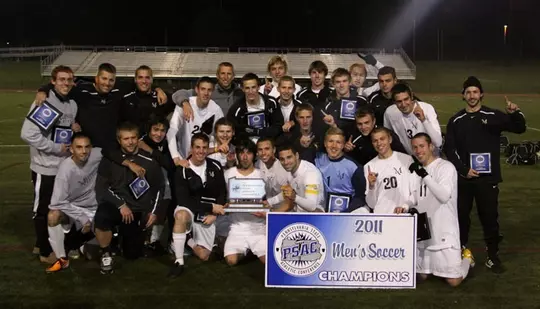
“Not getting scored on added to the magic and popularity of the team,” said Benzing. “Just that whole period was really great and everything worked out as far as putting ourselves in a good position. All of our playoff games were at home. When does that ever happen? You couldn’t ask for a better situation.”
“Widdow was a very defensive coach, especially that year—we weren’t destroying opponents,” said Buffuto. “We had a lot of 1-0, 2-1 close wins. We were defensive-minded, kept a good shape, and stayed in control.”
That stalwart defense booked the Marauders’ spot in that night’s penalty shootout, with both teams’ tournament survival on the line. Familiar echoes of heartbreak from the 2008 season loomed large for Millersville, when the team also was involved in a penalty shootout in the Elite Eight. The Marauders were outshot 5-4 and lost to Northern Kentucky, denying them a trip to the Final Four. Another concern prior to 2011’s shootout was that the team’s track record with penalty kicks during the season was less than stellar, having missed five of their seven attempts.
“We were terrible in PKs in 2011,” said Widdowson. “I think we had gone through three or four different shooters. That was a psychological barrier that we had to get through and get over. We were so bad during the year that we figured “now must be our time” so we might as well relax and finally do well in a shootout.”
“The pressure of a shootout is unlike anything else in sports,” said Buffuto. “You think that it’s easy when you look at it from the outside in: you’re shooting at a goal from 12 yards out. The goalie can’t move off his line until you approach your shot so you should be able to put this away. But the pressure of it is so immense in that situation that it’s hard enough to even put the shot on goal let alone put it in one of the corners. You have to just push everything else out of your mind, keep your eye on the ball, and realize that everything going on around you doesn’t matter. It’s about putting the ball in the back of the net.”
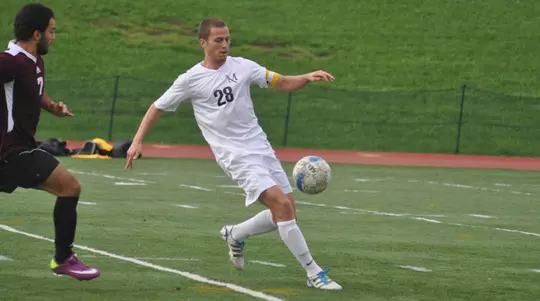
Geir Jordet, a professor at the Norwegian School of Sport Sciences, has accounted for 120 different variables in every attempted penalty kick. Anything and everything—including time intervals, the walk from midfield to the penalty spot, pre-kick routines, and outside noise variance—can and does affect shot attempts. Preparation and repetition can help players deal with the oftentimes crushing weight of the task.
“As soon as we know we’re in the playoffs we start figuring out who our penalty takers are,” said Widdowson. “We have all that set up—who our top five are, then six through 10, and have it all outlined. We practice it in training. Sometimes we line up all 10 takers in the center circle so they actually have to do the walkup and get used to that. We rehearse it as much as we can. I’ve been through enough penalty shootouts with Millersville now that I understand there’s absolutely nothing I can do about it once those players line up. Back then I was extremely nervous and tense because so much was on that game.”
“For the back half of that season, after practice, I went over to a net with a bag of balls and went for the same shot,” said Claffey. “I just did PKs. I was confident in stepping up just because while the whole team was doing shooting drills I was over there, instead of icing my knee, hitting bag after bag until they were done.”
Additional preparations for the winner-take-all shootout were underway, with Benzing steeling himself to face the onslaught of Rockhurst penalty takers. The psychological battle between keeper and shooter can be one of the most compelling facets of a shootout.
“I’ve done stuff in the past where I would go and kick the ball off the spot or pick it up and put it back down,” said Benzing. “I tried to watch the player—watch their body language and watch their eyes. If I guess a certain way, I go hard and commit to that way. If you hesitate for a split second, even if you guessed the right way, you might not get there. I was quick and athletic—not that tall—so I took the best guess and went 100 percent that way.”
“As a player and keeper I was never that nervous because all the pressure is on the penalty taker,” said Widdowson. “As a keeper you have five opportunities and the expectation is that you force one miss or make one save. As a taker, he has to be one-for-one. The biggest thing you want to try to do is upset their rhythm a little bit: trying to delay a little bit by being slow getting to my line or having a word with the referee that the ball isn’t on the spot and needs moving. Just trying to mess with the shooter’s routine and get in their heads a little bit.”
There were five seniors on Millersville’s 2011 roster. They were the ones to shoulder the responsibility as the team’s first five shooters and tasked with erasing the painful memory of the 2008 Elite Eight shootout loss which had occurred during their freshman season.
“Immediately when the 110 minutes ended I felt like “This is happening again,” said Claffey. ”The stress level didn’t go down for me at all, but all five seniors wanted to step up. If we were going to go out, it was going to be because one of us five missed.”
“I was captain and did the coin toss,” said Buffuto. “I called the toss, we won it, and I immediately said “We’re shooting first and I’m shooting first.”
Choosing to go first in a shootout can be a distinct advantage, as even more pressure can be placed on the team shooting second if they begin to trail in penalties made. The Millersville senior shooters, in order, were Buffuto, Ethan Daubert, Eric Pepper, John Claffey, and Aaron Roland. Buffuto, as he requested, led things off.
“I watched video of the Rockhurst goalie and I saw that he went super early on every shot,” said Buffuto. “I knew that if I hesitate a bit and hit this thing down the middle there’s no way he’s going to get to it. Which is exactly what happened. He took a step left early and I hit it a little bit to his right side, hard enough to where he had taken too big a step the other way to get back and save it. The relief after I made the shot was awesome but then you had to go to midfield and watch your team take on the same pressure.”
After Rockhurst’s Mark Magee scored to tie the shootout 1-1, Ethan Daubert stepped to up to the spot and the Marauders’ worst-case-scenario began to unfold: Daubert missed his PK.
“When Daubert missed—and it wasn’t a bad PK, the keeper just saved it—you felt freshman year coming back and thinking “It’s going to happen again,” said Buffuto.
The next shooter for Rockhurst was Kyle Miller, who struck true to give them the 2-1 advantage. The Ville’s Eric Pepper quickly tied it back up 2-2 with a make.
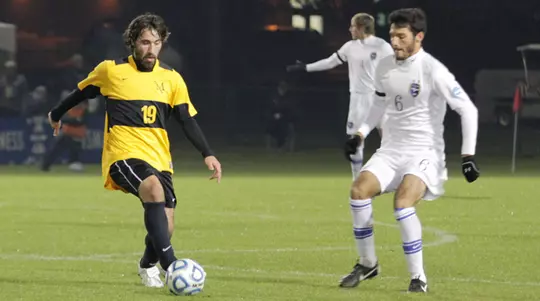
Back-and-forth they went. Ruben Perez scored for Rockhurst and then it was Claffey's turn to execute the shot he had practiced for hours upon hours.
“You shake a little bit walking up, but that’s the fun of playing a college sport," said Claffey. "It becomes your craft. I was always straight on, three steps out, and I pushed to the right instead of pulling across the goal. Not a ton of power, inside of the foot, push it to the right side and get it as close to the side netting as you can. If the goalie saves it, hats off to him, but there’s no time to get in your own head. It was muscle memory, rinse and repeat, and fortunately it worked out how I envisioned it.”
Claffey tucked the shot away to tie the shootout 3-3. Then it was Rockhurst's Joe Huppe's turn.
“This kid did the stupidest walk up,” said Benzing. “He put the ball down and didn’t even take a step back. He put his left foot right next to the ball and shot it with one swift motion, missing it wide left—to his right.”
Huppe’s error returned control of their own destiny back to the Marauders. If they continued to tally makes and Benzing could muster a save, a trip to Florida and the Final Four was in store.
Buffuto wasn’t worried. “Brad was a fantastic goalie and he was great on PKs,” he said. “He could stretch and he could move. I knew he was going to save one.”
The two teams went back and forth for three more rounds, including successful strikes from Millersville’s Aaron Roland, sophomore Andrew Dukes (the team leader in goals), and junior Matt Kadoch.
The drama continued until the eighth round of the shootout. Sophomore Colby Zeger, who likely wasn’t expecting to have to even shoot, calmly put his chance away to give Millersville a 7-6 advantage. The next shooter was Rockhurst’s John Merlo, who took his run-up and shot the ball to his right.
Brad Benzing had made 10 saves that night in regulation and the two overtimes, but the most memorable one he made doesn’t show up in the stat sheet. He dove to his left to get in front of Merlo’s shot, made the save, and sent the Marauders to the Final Four for the first and only time in program history.
“It’s every goalie’s dream to come up with the final save,” said Benzing. “That was a great feeling and it was almost like I never hit the ground. As soon as I made the save I was up and running toward midfield. Those guys clobbered me and Ethan Daubert was the first one who tackled me and was kissing my cheek, thanking me. He felt bad because of the miss. He didn’t want to be the guy that prevented us from going to the Final Four.”
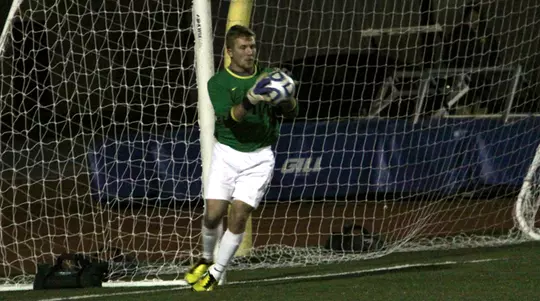
“Brad got there and it was just pandemonium,” said Buffuto. “We had built up to that moment for four years. As a senior class we had been to the NCAA Tournament three times. Of all those teams we were probably the least talented in 2011 but when you put those 11 guys on the field we fought for each other and knew that we were there for each other.”
“It was relief and joy of an entire career four years in the making,” said Claffey. “You’ve gotten to that point before but to break through that glass ceiling, in a way, is an out-of-this-world experience. I remember being in awe that it’s actually happening. Just overcome with emotion that had been built up through four years of some failures.”
To fully appreciate just how important that moment was for the 2011 team you have to understand those trials and tribulations of the three seasons previous: first, the shootout loss in 2008 to Northern Kentucky. Next, the 2009 Atlantic Regional loss to Charleston that followed another defeat in the PSAC title game versus Slippery Rock (which included a catastrophic first-half red card for Ville keeper Matt Langione.) Then, in 2010, the team climbed all the way to a No. 1 national ranking but once again had only postseason disappointment to show for it. The 2011 team had six losses and two draws in the regular season but turned it all around when it mattered most.
“2011 was a very up and down year for us,” said Widdowson. “We had talked a lot about how there’s no right or wrong way to win a championship. All the losses and ties we were having were opportunities to learn and grow. It reminds me of the last two seasons here when we’ve won championships. We’ve had some really tough stretches but they’ve brought the team together, taught us lessons, and allowed us to figure out solutions to our problems so we could peak at the right time. The 2011 team did precisely that.”
“I’ve always believed this, but it’s not always about having the best players,” said Benzing. “It’s about having the right players. I’ve been lucky enough to be a part of a lot of teams like that. To win several games in the NCAA tournament and get to the Final Four showed the kind of competitors we had. We knew how to win, work as a team, and overcome obstacles.”
“That part of life is always fun to look back on,” said Claffey. “There’s nothing in a job that can recreate that excitement of college sports. I think it’s really cool that we were the first to push through to the next level and set the bar until another team comes along. Until then we’ll relish in being the ones that got there.”
“We didn’t have the best talent compared to the teams we played against or even the other Millersville teams we played for but we had the best team,” said Buffuto. “When you put those 11 guys together on the pitch, I don’t think anyone touched us.”

